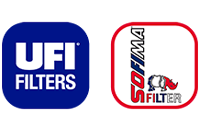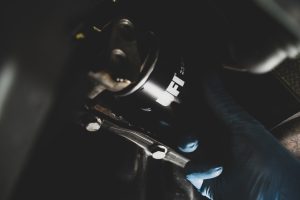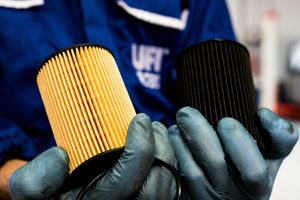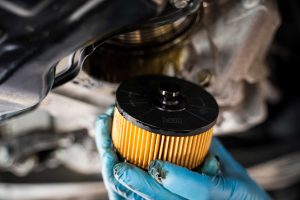Summer is upon us, and many motorists are preparing to set off on their holidays. One of the things UFI Filters recommends for a safe and peaceful journey is changing the oil filter.
But what exactly is the oil filter, and why is it so important to change it regularly? Here are some useful tips from UFI Group’s technicians for maintenance of your vehicle.
What is an oil filter, and why is it so important?
The engine oil filter is a component of your car engine*s lubrication system. Its main task is to remove impurities and particles of dirt present in the engine oil in order to keep the engine clean and correctly lubricated. Without an oil filter, dirt particles created by the movement of mechanical parts, as well as deteriorated or poor-quality oil, could lead to rapid damage to the engine, reducing its lifespan and increasing the chance of breakdowns. It therefore plays a fundamental role in protecting the component parts of the engine from corrosion and allowing its operation. Last but not least, it plays a crucial role in the management of the operating temperature, in order to prevent overheating of the engine due to friction between the components.
How often should the oil filter be changed?
The oil filter, like any other vehicle component, has a limited lifespan and must be changed regularly to guarantee efficient engine operation. Most vehicle manufacturers recommend changing the oil filter every 15,000 km for petrol engines, and every 25/30,000 km for diesel engines.? If you drive in extreme conditions, such as dusty environments, or with frequent cold starts, or if you drive an older model vehicle, the oil filter may need to be changed more frequently, every 10,000 km. Nevertheless, vehicle manufacturers almost always recommend in their manuals that the filter be replaced at every oil change. Alternatively, if the vehicle is used infrequently, the oil filter can be changed once a year.
In particular, before setting off on a long journey such as your summer holidays, it is important to check the oil level, ensure that the filter has been recently changed, and have the vehicle serviced if necessary. This is because during long summer journeys, cars are subjected to greater stress than usual and the engine could need extra lubrication to work correctly.
When changing your oil filter, it is advisable to put your trust in a professional with quality OE-equivalent spare parts, guaranteed by the UFI and SOFIMA aftermarket catalogues.
How do I know if an oil filter is beginning to get old or clogged?
- If you notice oil stains under the vehicle.
- If you notice engine overheating.
- If there is excessive oil consumption.
- If the oil pressure warning light comes on and remains lit.
What types of oil filters are there?
UFI Filters supplies two types of oil filters: immersion oil filters and screw-on oil filters.
- Immersion oil filters are found inside a complete aluminium or plastic module. They are the most ecological solution, as they are composed only of a central structure made of recyclable plastic, around which the filter media is wrapped, held by two plates. UFI Filters develops filter media and manufactures them internally according to specific formulations named FormulaUFI. More specifically, the oil filters in UFI’s catalogue for light vehicles are available in FormulaUFI.Micron and FormulaUFI.CELL.
FormulaUFI.Micron is a synthetic fibre compound which guarantees the highest levels of efficiency with a filtration capacity of 50% down to 4 microns, is resistant to high pressures, and is suitable for modern Euro 6D Final engines. It is used, for example, in the 25.139.00 UFI and S 5139 PE SOFIMA filters for Opel/Vauxhall Corsa, Fiat Tipo and Alfa Romeo Mito applications. Or 25.093.00 UFI and S 5093 PE for Opel brand vehicles, such as the Insignia.
FormulaUFI.CELL is a material made from cellulose combined with synthetic fibres to maximise the retention capacity and pressure resistance, and is used, for example, in the 25.083.00 UFI and
S 5083 PE SOFIMA filters for Fiat 500 X, Jeep Renegade and other Stellantis vehicles.
- External screw-on filters are generally composed of an outer metal structure in which the filter material is located, therefore the most traditional and long-standing filtration solution. They have a threaded end for coupling to the engine, generally near the lubrication pump. Examples include the 23.284.00 filter historically developed by UFI for Ferrari, and the 23.460.00 UFI, SOFIMA S3460 R, for Alfa Romeo and Lancia.
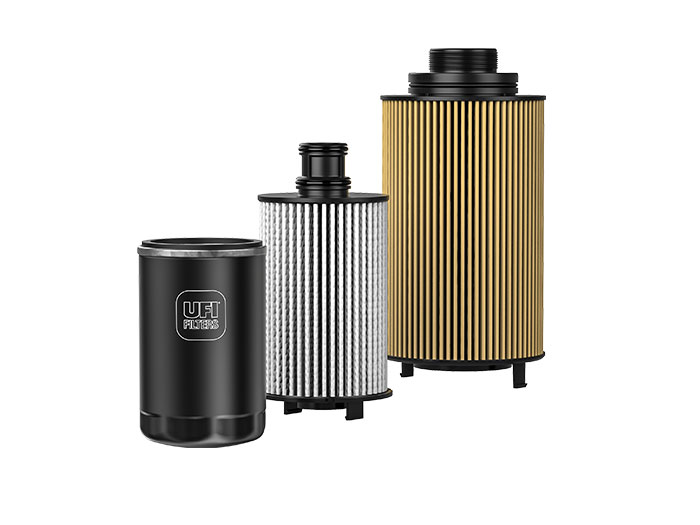
All UFI and SOFIMA filtration solutions can be viewed in the Aftermarket online catalogues www.ufi-aftermarket.com and www.sofima-aftermarket.com, which contain 356 product references for car and light commercial vehicle applications.
